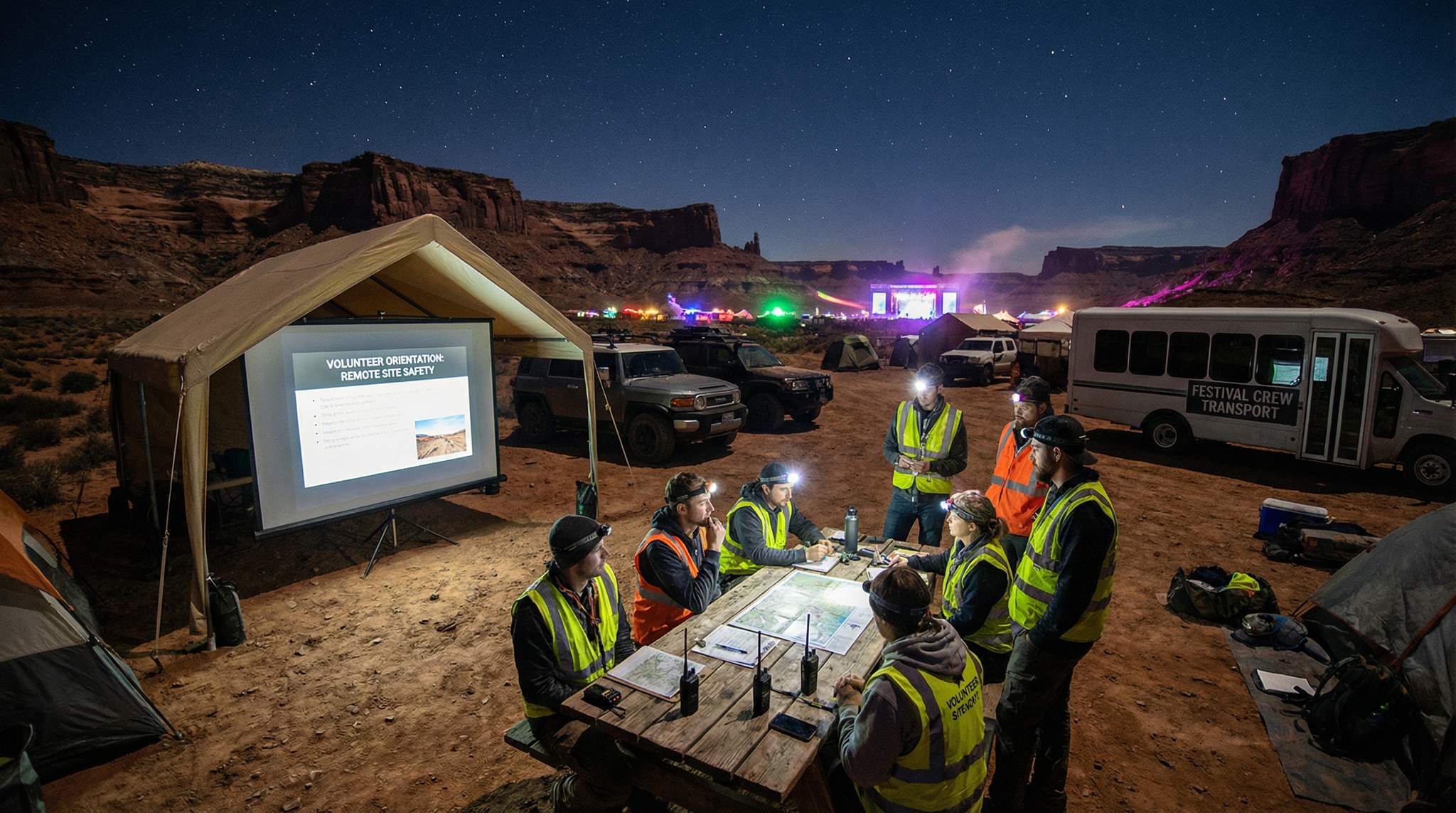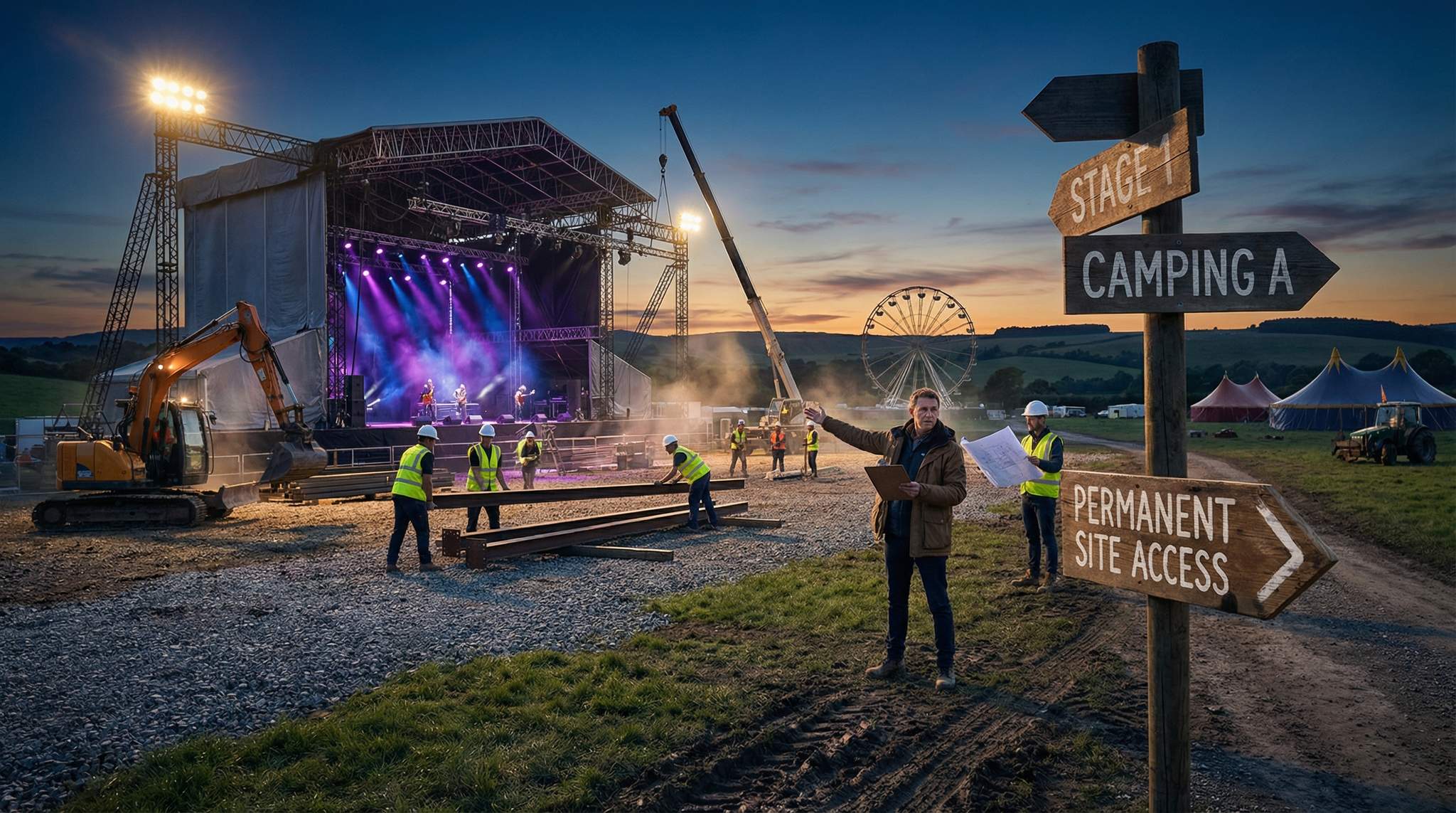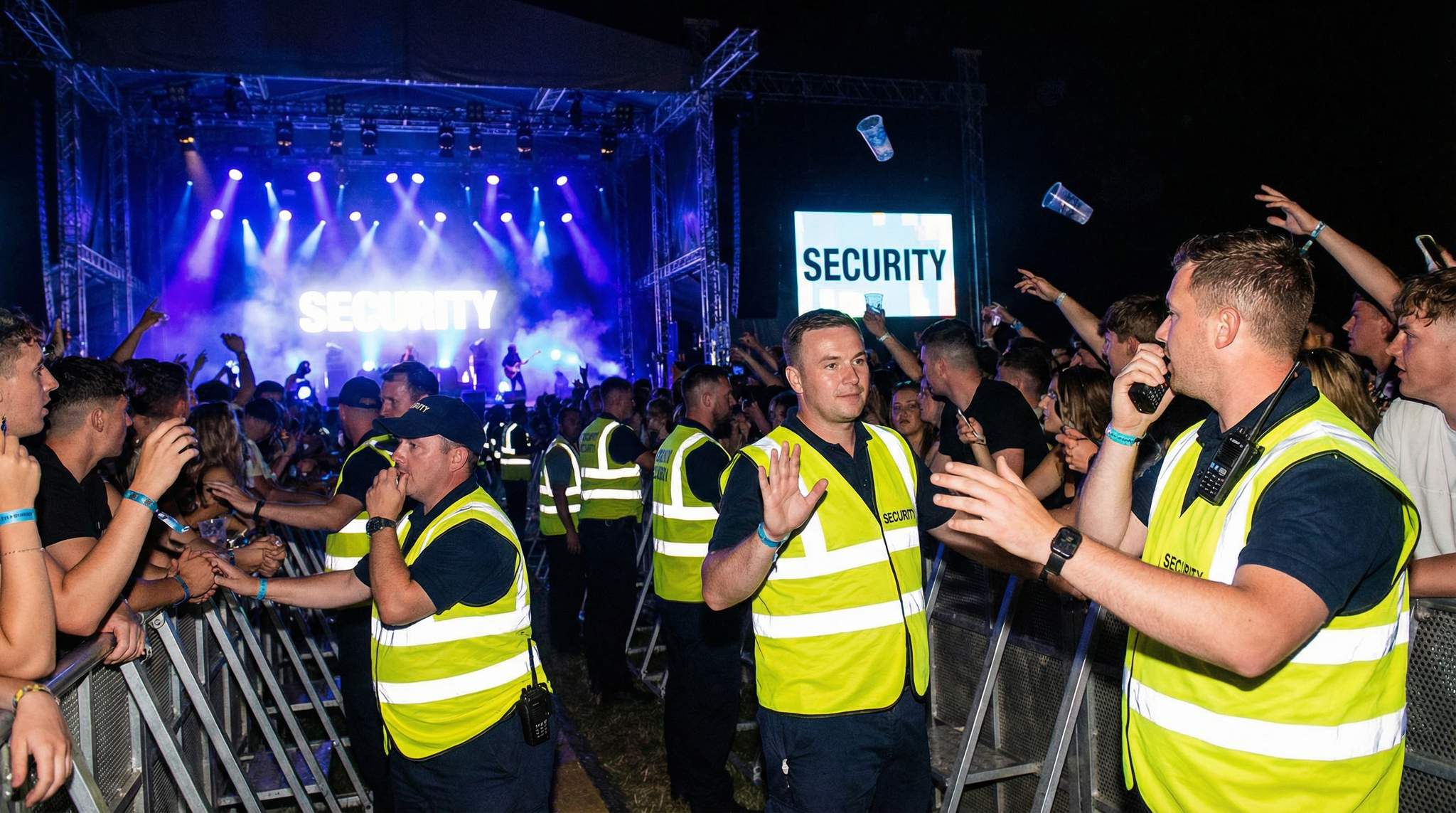Remote location festivals offer breathtaking experiences far from civilization, but they also come with unique challenges – especially when it comes to volunteer programs. Hard-to-reach venues mean festivals must work extra hard to attract, train, and retain a reliable volunteer crew. Seasoned festival producers know that a successful remote festival requires thorough planning for volunteers: from helping with travel costs and providing proper training, to creating fair shift schedules and assigning appropriate roles. This guide distills decades of festival production wisdom into practical strategies for managing volunteers when getting there is hard.
Unique Challenges of Remote Festival Volunteers
Organizing a festival in a tucked-away mountain, desert, or rural locale often means limited local manpower. Festival organizers can’t just rely on a nearby city’s volunteer pool; volunteers might have to travel hundreds or even thousands of miles to get there. This distance introduces challenges:
- Travel Barriers: High transportation costs, time off work for travel, and complex routes can deter would-be volunteers. If not addressed, the festival could end up with a volunteer shortage on site.
- Harsh Environments: Remote venues – whether the Nevada desert, Australian outback, or Himalayas foothills – can involve extreme weather and minimal infrastructure. Volunteers face heat, cold, or altitude that make their jobs tougher, so they need preparation and support.
- Limited Backup Options: In a city festival, if a volunteer doesn’t show, a replacement might be found quickly. At a remote festival, every volunteer slot is critical because finding last-minute help is nearly impossible given the location. Attrition or no-shows can seriously impact operations.
- Volunteer Motivation: Volunteers typically exchange labor for a festival ticket and experience. But when the journey itself is costly or difficult, the usual “free ticket” perk might not be enough incentive, according to industry analysis on volunteer motivations. Organizers must go the extra mile (sometimes literally!) to motivate and reward their crew so they feel their effort is worthwhile.
Understanding these challenges is the first step. Next, let’s explore solutions – from travel stipends to training – to build a rock-solid volunteer program for even the most remote events.
Incentivizing Volunteers with Travel Support and Perks
One of the biggest hurdles for remote festivals is simply getting volunteers on site. If an event is hours from the nearest city, or requires flights and off-road treks, incentivize attendance by offsetting travel burdens:
- Travel Stipends & Reimbursements: Consider offering partial travel stipends or reimbursements to volunteers, especially those coming from afar. Even a modest fuel allowance or help with a plane or bus ticket can tip the balance in convincing someone to volunteer. Some events and organizations provide contributions toward volunteer expenses when full reimbursement isn’t feasible. For example, a festival might reimburse a set amount of gas money or organize a free shuttle from a major city hub for volunteers. This shows that the festival values their commitment and eases the financial load of the journey.
- Accommodation and Food: Remote festivals should plan to house and feed volunteers, since there may be no hotels or restaurants around the corner. Set up a volunteer campground or provide on-site lodging (even if it’s just reserved tent space or bunks in a cabin). Ensure volunteers have access to meals – many festivals offer at least one hot meal per shift or per day to volunteers. Keeping the volunteer team fed and sheltered not only maintains morale, it’s a practical necessity when the nearest town is miles away.
- Extra Perks for the Adventure: Sweeten the deal with perks that acknowledge the extra effort volunteers make. This can include exclusive early access to the festival site, a behind-the-scenes tour, or a special volunteers-only afterparty once the event winds down. Provide volunteers with festival merch, certificates of appreciation, or even a small stipend as a thank-you. Little gestures go a long way when people are volunteering in challenging conditions. Importantly, ensure that the basic trade – volunteer hours for a festival experience – remains fair. If volunteers are giving significant labor in a remote setting, make sure they still get ample time to enjoy the festival they helped create. No one should feel like they “paid for a ticket with their time” only to be exhausted and miss all the fun, a balance discussed in articles regarding festival volunteer conditions.
Finally, when recruiting, be transparent about the challenges and the support they’ll provide. Let applicants know if you’re covering some travel costs, how food and lodging will work, and exactly what they can expect. This honesty helps attract volunteers who are prepared and excited, not surprised by the difficulties.
Comprehensive Training for Remote Conditions
Once volunteers are on board, training becomes the next priority – even more so given the remote context. Proper training ensures volunteers are confident, safe, and effective in their roles, despite the unusual environment:
Planning a Festival?
Ticket Fairy's festival ticketing platform handles multi-day passes, RFID wristbands, and complex festival operations.
- Pre-Festival Orientation: Don’t wait until everyone arrives on site to start training. Host virtual orientation sessions or webinars ahead of the festival. These can cover the festival layout (with maps), volunteer duties, chain of command, and what to pack for the remote location. For instance, volunteers headed to a mountain festival should know to bring warm layers and flashlights, while those going to a jungle event might need mosquito repellent and sturdy boots. Some festivals even distribute a volunteer handbook or video guide with all essential information beforehand, so each person comes in with baseline knowledge.
- Required Training Sessions: Identify which roles absolutely require training or certification and mandate it. Safety teams (like first aid volunteers or fire watch crews), for example, might need a certification or a briefing from professionals. At Burning Man in the USA – a legendary remote desert gathering – volunteer departments like the Black Rock Rangers require all volunteers to attend special training sessions prior to the event. Many festivals similarly require volunteers to complete online training modules or quizzes to ensure they grasp key procedures.
- On-Site Briefing and Drills: Plan an on-site orientation when volunteers arrive at the venue, before the festival gates open. This can include a tour of the site, pointing out first aid stations, water refill points, emergency exits, and volunteer rest areas. Conduct brief drills or role-play scenarios if relevant (for example, practicing radio calls or guiding an attendee to the medical tent). An on-site briefing reinforces the virtual orientation and grounds volunteers in the reality of the terrain and layout. In one volunteer program, all volunteers and team leads had to attend a compulsory 2-hour training session online, plus an on-site briefing on arrival day – a great example of blending pre-event and on-site training.
- Local Experts & Cultural Training: If a remote festival is in an area with a distinct local culture or environmental hazards, bring in experts to brief your team. For a festival in rural Indonesia, for example, local community leaders could train volunteers on cultural sensitivities and basic local language phrases to help them interact with residents. Or if an event is deep in the New Zealand wilderness, a park ranger might give a talk on wildlife safety and minimal impact practices. This extra layer of training helps volunteers feel prepared and shows respect to the location and its people.
Thorough training is an investment that pays off immensely. A well-trained volunteer can handle issues independently or know exactly how to get help, whereas an untrained volunteer in a remote setting could be overwhelmed. When everyone knows their role, the festival’s operations become much smoother – a crucial factor when immediate backups aren’t available due to distance.
Scheduling Realistic and Fair Shifts
Remote festivals are often multi-day affairs, and it’s vital to schedule volunteer shifts that are realistic, humane, and mindful of the tough conditions. Burnt-out volunteers are a liability anywhere, but in a remote location the stakes are even higher if someone is too exhausted to perform their role:
- Keep Shifts Manageable: Industry veterans recommend capping volunteer shifts around 6 to 8 hours at most. This range strikes a balance – you get enough work out of each volunteer, and they get time to rest or enjoy the festival. In practice, many festivals ask for roughly three shifts over a weekend event, totaling about 18–24 hours of work in exchange for a ticket. For example, a volunteer might do three 6-hour shifts or three 8-hour shifts spread across the festival days. Avoid marathon shifts; no volunteer (especially an unpaid one) should be working 12+ hours straight. If a particular role absolutely requires a longer duty (say, an overnight fire safety watch), split it into two shorter shifts or pair volunteers so they can tag-team and take breaks.
- Plan for Overnight Coverage Carefully: Remote festivals often have 24-hour operations – attendees camping on site means things are happening at all hours. It’s important not to dump all undesirable late-night shifts on a few unlucky volunteers. Rotate the night shifts fairly so no one works more than one overnight if you can help it. Many volunteer programs ensure each person gets a mix of time slots – morning, afternoon, and maybe one night – rather than, say, all 3 a.m. shifts for one person. If a festival doesn’t absolutely need volunteers overnight (perhaps professional security covers it), organizers should consider giving volunteers the night off entirely.
- Built-In Breaks and Rest: Just as a lineup is scheduled for performers, plan breaks for volunteers. During each shift, especially in extreme weather, volunteers should have access to shade, water, and short rest periods. Designate a volunteer lounge or rest tent on site where off-duty volunteers can recharge – perhaps with snacks, hydration drinks, and basic first aid. Remind volunteers to sleep and pace themselves; they might be excited to be there and try to party after shifts, but in a remote environment, fatigue can sneak up quickly. Pro tip: If a volunteer has a favorite band playing, try not to schedule them during that set if possible. A small scheduling kindness like this boosts morale and shows that the festival management cares about their experience too.
- Flexible Scheduling & Backup Plans: No matter how well you plan, expect the unexpected. A volunteer might fall ill or be unable to arrive on time due to travel delays. Build a little flex into your schedule – have a few “floater” volunteers or staff who can cover if someone misses a shift. In remote locations, sometimes volunteers might even want to extend their help when they see gaps; appreciate that, but never exploit it. If someone is picking up an extra shift out of goodwill, ensure they’re still getting enough rest and not pressured to overextend. It’s better to run slightly understaffed for a while than to push a volunteer beyond safe limits.
By scheduling smartly and humanely, the festival will have a volunteer team that remains energetic and enthusiastic throughout the festival. Remember, happy volunteers often go above and beyond, which is exactly what’s needed in a remote setting where every extra hand helps.
Assigning Roles: Use Volunteers Wisely (Safety First!)
Volunteers are the lifeblood of many festivals, but knowing which roles to assign to volunteers versus paid professionals is key, especially in high-risk, remote environments. The rule of thumb is: volunteers should support the festival, not shoulder its most critical safety responsibilities. Here’s how to strike the balance:
- Critical Safety Positions – Hire Professionals: For any role that involves attendees’ safety or requires technical expertise, bring in licensed professionals. Security is a prime example – large festivals will have a professional security firm or crew handling crowd management, entry checkpoints, and emergency response. Volunteers can certainly assist as stewards or spotters, but they should not be the primary line of defense in a crisis. In fact, regulations in many countries prohibit unlicensed individuals from performing certain security tasks. For instance, in the UK, security staff must hold an SIA licence, meaning volunteers legally cannot do jobs like searching bags or ejecting problem attendees. Similarly, medical services should be led by certified medics or paramedics. If you have volunteer first-aiders or medical students on your team, that’s wonderful – they can help triage or support the pros, but always have at least a core team of paid, certified medical staff on site.
- Technical and Operational Roles: Complex production roles (e.g. sound engineers, structural riggers, electricians for generators, pyrotechnics supervisors) demand trained experts. A volunteer without professional qualifications should never be solely responsible for something like stage rigging or operating heavy machinery. The risk of serious error is too high. Use volunteers as runners or assistants in these domains – for example, a volunteer can help carry equipment or tape down cables under a crew chief’s direction, but the crew chief (a seasoned pro) makes the critical calls. In one cautionary tale, a poorly wired setup at a festival caused a power outage – the lesson learned was to leave electrical work to certified electricians, not well-intentioned volunteers.
- Appropriate Volunteer Roles: So what are good roles for volunteers at a remote festival? Plenty! Volunteers excel as greeters, information booth staff, wristband checkers, parking attendants, stagehands (under supervision), art installation guides, merch booth helpers, workshop facilitators, and cleanup/ecology team members. These positions are important for the festival experience yet are low-risk in terms of safety. Even here, provide the necessary training and tools: a parking volunteer should wear high-visibility vests and have a flashlight if directing cars at night; info booth volunteers should have updated schedules and a radio to call for help if needed. By matching volunteers to appropriate roles, you ensure they add value without being put in situations beyond their capability.
- Supervision and Chain of Command: Even with non-critical roles, a remote festival environment means things can change quickly (weather shifts, schedule changes, etc.). It’s wise to have a clear hierarchy: designate team leaders or area supervisors (who could be experienced volunteers or paid staff) to whom volunteers report. Those leaders in turn coordinate with festival management. This way, if a volunteer encounters a problem – say, an altercation in the camping area or a missing child – they immediately escalate it to the professionals or managers who can handle it. Never leave volunteers isolated without guidance. Regular check-ins (via radio or in-person) between staff and volunteer teams are crucial for safety and effectiveness.
In essence, balance is key. Volunteers should be the helping hands and friendly faces that enhance the festival, while professionals should handle the critical systems that keep everyone safe. This dual approach leverages the enthusiasm of volunteers and the expertise of paid crew, creating a robust workforce.
Logistics, Communication, and Contingency Plans
Running a festival in a remote spot means logistics are amplified – communication channels might be limited and everything takes more time. Here are additional tips to ensure the volunteer program runs smoothly:
Need Festival Funding?
Get the capital you need to book headliners, secure venues, and scale your festival production.
- Early Arrival and Transportation Coordination: For very remote events, consider having volunteers arrive a day early. This buffer ensures everyone is on site in time even if they face travel delays, and it gives you a chance to do that thorough on-site training. Arrange group transportation if possible: for example, hire a bus to pick up a cohort of volunteers from the nearest city or airport. This not only relieves volunteers from figuring out last-mile travel, but also helps ensure everyone arrives together and on time.
- Communication Tools: Equip your volunteers with the means to stay connected across the site. In remote areas, mobile signals might be weak or non-existent. Two-way radios are a must for key volunteer leaders (and any volunteers in roles spread out over the venue). Establish a simple communication protocol: e.g., which channel to use, code words for emergencies, and how to reach the control center. Also, circulate a contact list sheet – names and roles of lead staff, emergency contacts, nearest hospital or ranger station – so volunteers have important info handy even if tech fails.
- Health and Wellbeing Checks: The wellbeing of your volunteer team is paramount. Implement brief daily check-ins or team meetings where volunteers can report any issues, whether it’s feeling unwell or noticing a safety concern. In a remote setting, minor issues like dehydration or fatigue can escalate, so proactively monitor volunteer health. Assign a staff member or experienced volunteer as a Volunteer Coordinator who looks after volunteer welfare – making sure they take breaks, have access to medical care if needed, and are coping well with the environment. This person can rotate, but there should always be someone with this responsibility each day.
- Contingency Plans for No-Shows: Despite best efforts, there may be volunteers who cancel last minute or simply don’t arrive. Have a contingency for essential roles: perhaps cross-train some volunteers in multiple tasks so they can be reassigned in a pinch. If budget allows, keep a small paid crew on standby for vital operations (like a couple of extra security guards or a runner) in case volunteer numbers fall short. Additionally, using a scheduling and management tool can help tremendously here – for instance, the Ticket Fairy platform allows festival organizers to track ticketed volunteer credentials and communicate updates quickly, helping to reorganize shifts on the fly if needed. Being prepared to adapt is part of festival life – even more so out in the wild.
- Respecting Local Communities: Remote festivals often take place near small towns or villages. It’s a great idea to involve the local community in the volunteer program when possible. Locals bring valuable knowledge of the area and may be more readily available. If you have local volunteers, ensure they’re integrated with the rest of the team and perhaps task them as cultural ambassadors or guides. Also, be mindful of the community’s tolerance – for example, avoid over-relying on the goodwill of local volunteers for strenuous tasks without compensation, as this can strain community relations. After the festival, thank the local community specifically, perhaps with a joint clean-up day or a donation to a local cause, to show appreciation for hosting the event.
Frequently Asked Questions
How can remote festivals attract and retain volunteers?
Organizers incentivize attendance by offsetting travel burdens through partial stipends, fuel reimbursements, or organized shuttles from major hubs. Providing on-site accommodation like reserved tent space and ensuring access to hot meals are also critical strategies. Offering exclusive perks such as early access, merchandise, or behind-the-scenes tours further motivates volunteers to make the difficult journey.
What is the ideal shift length for festival volunteers?
Industry veterans recommend capping volunteer shifts at 6 to 8 hours to prevent burnout and ensure safety in remote conditions. A typical schedule involves roughly three shifts over a weekend event, totaling 18–24 hours of work in exchange for a ticket. Organizers should avoid marathon shifts and rotate overnight duties fairly so no single volunteer works excessive late nights.
What training do volunteers need for remote events?
Remote festival volunteers require comprehensive preparation including pre-festival virtual orientations and mandatory on-site briefings before gates open. Training must cover site layout, environmental hazards like extreme weather, and specific role duties. Safety teams often require additional certifications, while general volunteers benefit from drills and cultural training to handle issues independently when professional backup is distant.
Can volunteers work as security guards at festivals?
Volunteers should not perform critical security functions, as regulations often prohibit unlicensed individuals from tasks like searching bags or ejecting attendees. Festivals must hire licensed professionals for security, medical services, and technical rigging to ensure safety. Volunteers are better suited for low-risk support roles such as greeting, parking assistance, and information booth staffing under professional supervision.
How do festivals handle volunteer communication without cell service?
Remote festivals equip key volunteer leaders with two-way radios to maintain contact when mobile signals are weak or non-existent. Organizers establish clear communication protocols, including specific radio channels and emergency code words. Additionally, distributing physical contact lists with names of lead staff and emergency services ensures volunteers have essential information even if technology fails.
Do festivals provide food and accommodation for volunteers?
Remote festivals typically provide on-site lodging, such as volunteer campgrounds or reserved tent space, and ensure access to meals since local infrastructure is often lacking. Many events offer at least one hot meal per shift or day to maintain morale and energy levels. Providing shelter and food is a practical necessity when venues are miles from the nearest town.





